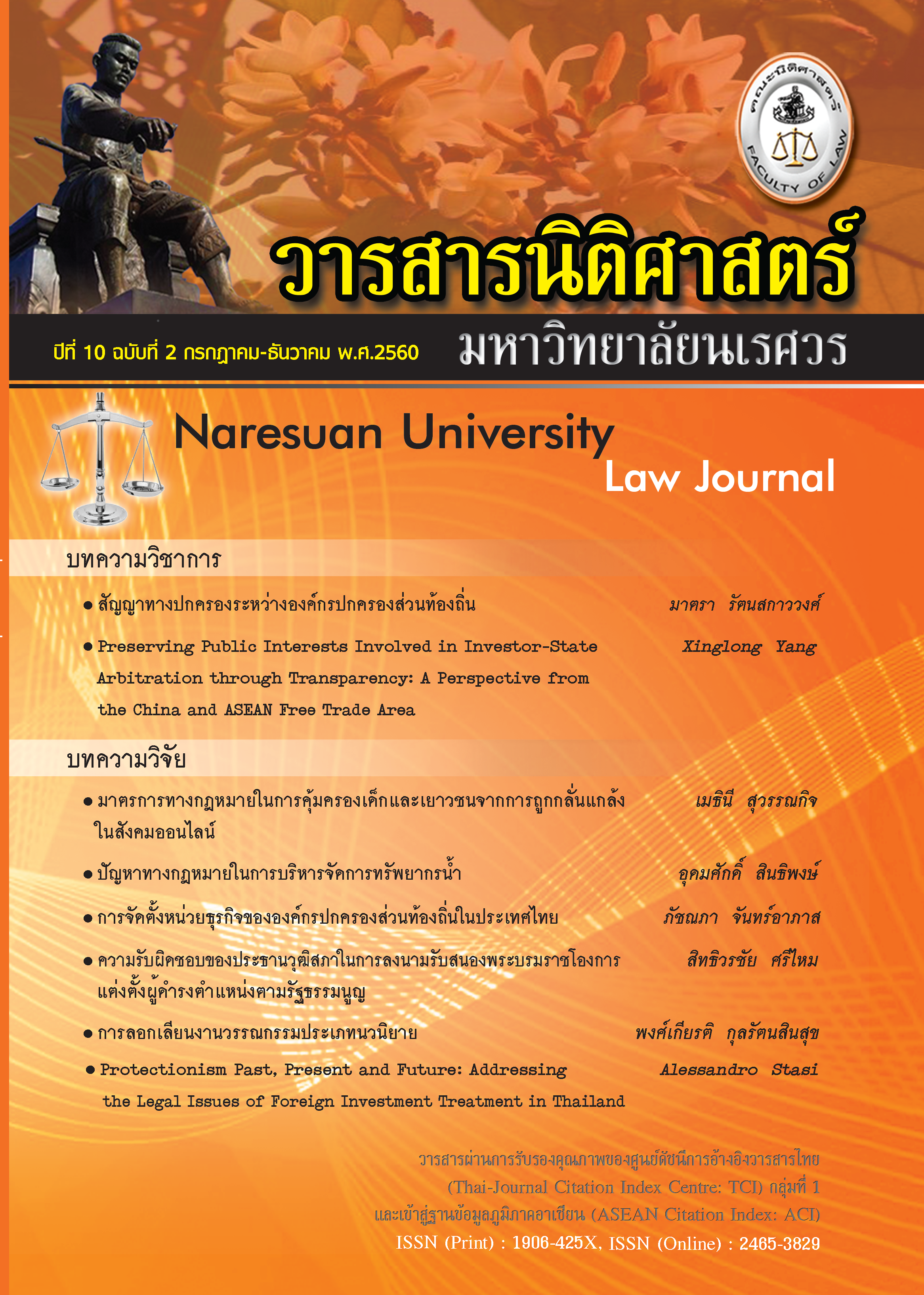การลอกเลียนงานวรรณกรรมประเภทนวนิยาย
Main Article Content
บทคัดย่อ
งานวิจัยนี้มีวัตถุประสงค์เพื่อศึกษาความสัมพันธ์ระหว่างการละเมิดลิขสิทธิ์ (Copyright Infringement) กับการลอกเลียนผลงาน (Plagiarism) และผลทางกฎหมายจากการลอกเลียนผลงาน จากการศึกษาพบว่า การลอกเลียนผลงาน ในส่วนที่เป็นความคิด และแนวคิดที่ปรากฏในผลงานสร้างสรรค์ รวมถึงโครงเรื่อง (Plot) ของนวนิยาย เป็นข้อยกเว้นที่ไม่ได้รับความคุ้มครองตามพระราชบัญญัติลิขสิทธิ์ พ.ศ. 2537 มาตรา 6 วรรคสอง รวมถึงในกรณีที่เนื้อหาของนวนิยายคล้ายคลึงกับนวนิยายของผู้อื่นในส่วนของข้อเท็จจริงทั่วไป สถานที่ที่มีอยู่จริง คำสามัญ ความคิดเห็นต่างๆ รูปแบบของการเขียน หรือการพรรณนาเรื่องราว และโครงสร้างของงานวรรณกรรมที่เป็นรูปแบบตายตัว เป็นการกระทำที่ไม่ละเมิดลิขสิทธิ์ และเมื่อศาลจะต้องพิจารณาข้อเท็จจริงในกรณีที่มีความคล้ายคลึงในเนื้อเรื่องของนวนิยายอันเกิดจากการลอกเลียน ศาลจะต้องพิจารณาเนื้อเรื่องของนวนิยายพิพาททั้งหมด โดยพิจารณาจากโครงเรื่อง บทสนทนา ของตัวละคร (Dialog) เหตุการณ์ที่ปรากฏในเนื้อเรื่อง (Event) ลักษณะของตัวละครรวมถึงบุคลิกของตัวละคร (Character) ฉากที่ปรากฏในเรื่องราว (Setting) และองค์ประกอบอื่นๆ ซึ่งไม่พิจารณารวมไปถึงส่วนที่เป็นความคิด (Idea) แนวคิด กระบวนการ (Method) และข้อเท็จจริง (Fact) ที่ปรากฏในนวนิยาย ทั้งนี้ เมื่อเนื้อเรื่องของนวนิยายพิพาทมีความคล้ายคลึงกันในส่วนที่เป็นข้อเท็จจริงทั่วไป และมีความคล้ายคลึงไม่เกินร้อยละ 20 ของเนื้อเรื่องทั้งหมด ศาลจะพิพากษายกฟ้องคดีละเมิดลิขสิทธิ์ในงานวรรณกรรมประเภทนวนิยาย
Article Details
เอกสารอ้างอิง
Chompoonuch Boonyawan. “Plagiarism.” Fercit Newsletter 9, no.2 (2009): 1-2. [In Thai]
Craig, Carys J. “Resisting “Sweat” and Refusing Feist: Rethink Originality After CCH.” U.B.C. Law Review 40, no. 1 (2007): 109-113.
Frye, Brian L. “Plagiarism is Not a Crime.” Law Faculty Scholarly Articles 54 no.133 (2016): 159-160.
Lippman, Katherine. “The Beginning of the End: Preliminary Results of an Empirical Study of Copyright Substantial Similarity Opinions in the U.S. Circuit Courts.” Michigan State Law Review 513 (2013): 547-548.
Olson, Dale P. “Copyright Originality.” Missouri Law Review 48, no. 1 (1983): 35-46.
Prakong Jaroenjitrkam. Concept Review Writing for Literature. Bangkok: Thammasat University, 2008. [In Thai]
Sengupta, Shantashree S. “Copyright Infringement & Plagiarism: Are They Really Two Sides of a Coin?.” CTBC’s IRJ 2, no. 2. (2015): 19-22.
Wanida Sangsarapun. ‘’Freedom Scope for Expression under Limitation of Law.” Ombudsman Journal Special Edition (2013): 23-27. [In Thai]
Yin, Lee Harn. Copyright and Freedom of Expression: A Literature Review. UK: Newcastle University, 2015.


